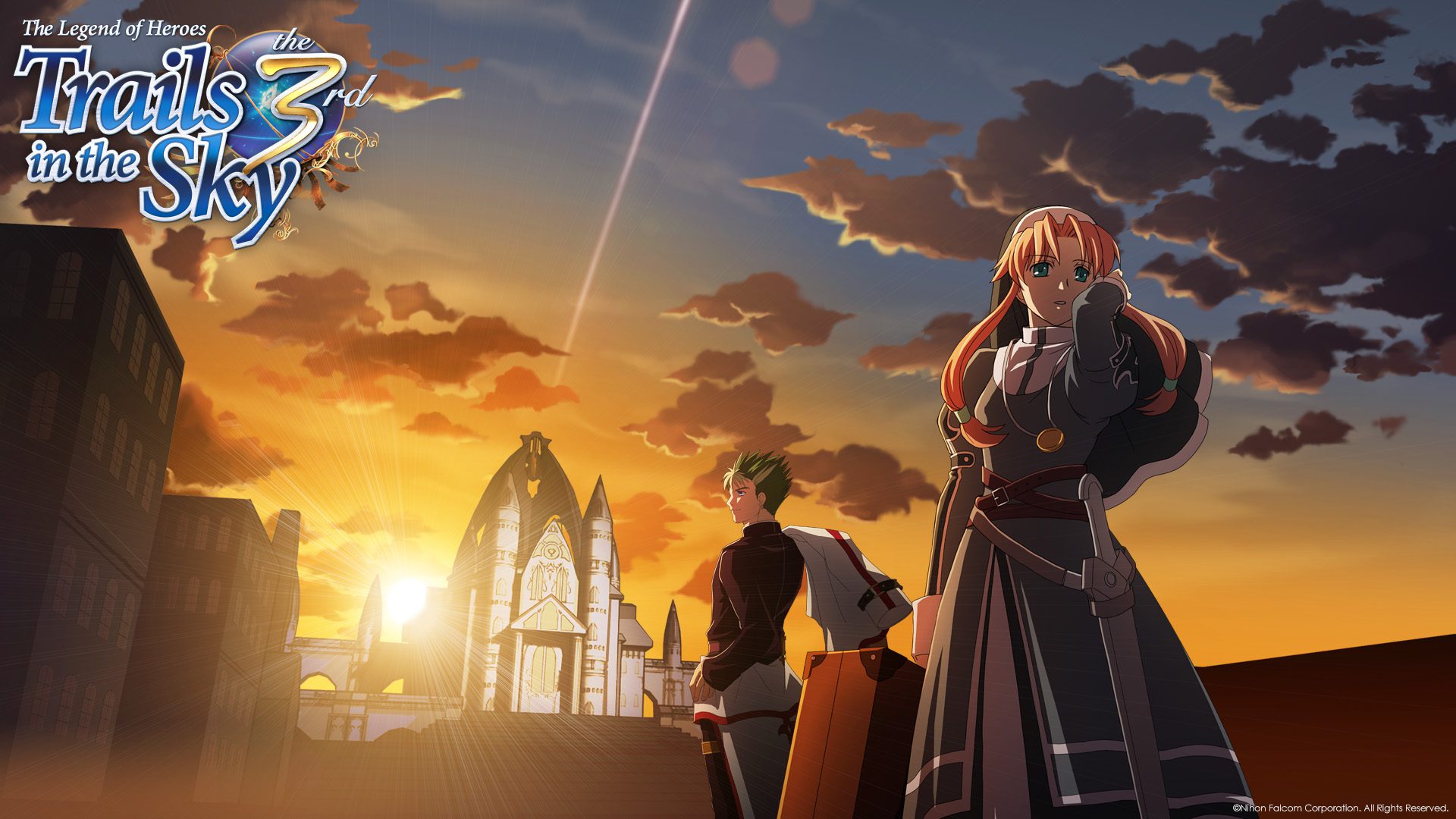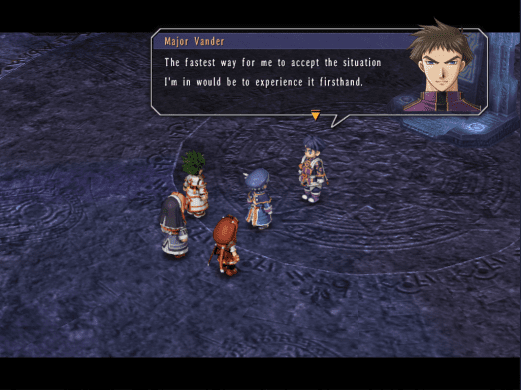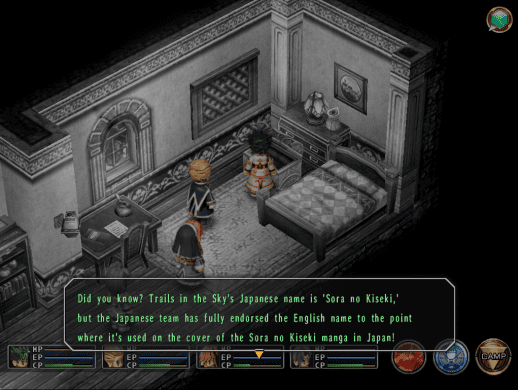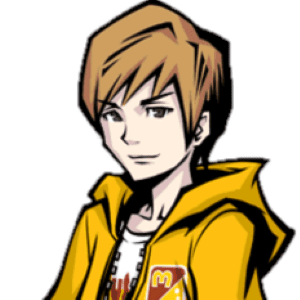Wrapping up our foray into the original Trails in the Sky trilogy, today’s title represents a break from the series format which nothing in the series’ western catalog has replicated, at least up until Trails from Zero was released (review of that coming soon™!). There is no title past itself for which the narrative can be stretched across, so everything it wants to do has to be accomplished before the credits start rolling. It’s a surprisingly daunting challenge for a series which roots itself in long-term interconnectivity, but they made an effort to meet that challenge and I’m here to see how it all went down. And hey, this one took only 20 hours to get through! ‘Bout time they figured out what a word limit is… not that I know either.

Developed by Nihon Falcom, published by Xseed Games, and released worldwide in 2017, The Legend of Heroes: Trails in the Sky the 3rd is an psychological anime rpg made available on PC. Its premise involves two clerics getting stuck in an illusory world and their fight to uncover the mystery at its core. Players interact with the game through heavy combat and exploration, as well as plenty of reading and menu work. Please note that there will be spoilers for Sky and Sky SC in this review. I also want to mention that I played all of the Cold Steel games before the Sky trilogy in case any new readers are unaware.
The story of Trails in the Sky the 3rd switches perspective away from the previous heroine and follows Father Kevin Graham, a member of Sky SC’s ensemble cast and the Fifth Dominion of the Gralsritter, an order of knights in service of the Septian church. The game opens half a year after the previous game with Kevin reuniting with his childhood friend Ries Argent as she is placed under his care as a squire, all while the two collect a strange artifact which came from the wreckage of the Liber Ark. It isn’t long before the artifact pulls the two into another world known as Phantasma and they must make their way through a fiend-infested labyrinth while finding and recruiting the help of characters from across the Sky trilogy. The tale of Sky the 3rd definitely has a certain contrived feeling to it when read aloud, and after having finished it I can tell you that the fact that the cast from across the trilogy is wrapped up in these events regardless of where they were is honestly a pretty unbelievable set up. I think the story would have definitely made a lot more sense if the rules for who gets pulled into Phantasma were more clearly defined and the cast was curated down a bit accordingly. But if you are willing to look past the set up and just focus on the main story itself… It is by far the best thing the Trails series has done thus far.
The narrative focuses pretty much exclusively on Father Kevin and Ries, exploring their past lives and how it has shaped them into the people they are today, as well as where the two go from there. It’s really hard to discuss this in particular detail without getting into spoilers, so just believe me when I say that the story goes into some really heavy and dark places in its later sections but the tale being spun is incredibly poignant, especially considering it accomplishes a more relatable and impactful story in a single 20 hour game then any other Trails narrative was capable of doing in two games. Though to be fair, you can increase this length by quite a bit by seeking out various side doors in Phantasma which play narrative scenes that epilogue events from Sky SC, fill in background details from the trilogy as a whole, and do some major foreshadowing for the Crossbell and Erebonia games. These serve as the main narrative link to the previous games and players who liked the cast of Liberl will find a lot to enjoy in seeing how their favorite characters’ stories moved forward after the events of Sky SC. On the whole, despite some rather forced elements surrounding its foundations, Sky the 3rd is a tale that pulls you in with intrigue and weaves a powerful set of revelations and triumphs, creating a finale that caps off this trilogy with more love and fanfare than it has any right to.

Gameplay-wise, Sky the 3rd plays pretty much identically to the previous entry, from the combat system to the quartz customization system. However there are a few satellite features that give the game enough of a twist so as to keep it fresh in comparison to its predecessors. The first being the presence of the Higher Elements, a feature which made an appearance in the Cold Steel games and was even similarly omnipresent in Cold Steel IV, but made its series debut in this one. Under the Higher Elements conditions, the number of element weaknesses to keep track of increases from four to seven, making a good selection of Arts paramount if you want to take advantage of their raw strength. The other effect is that the battle timeline has more powerful events on it like turns when no damage is dealt or turns where attacks instantly kill their targets, so being able to properly manipulate the turn order is vital if you want to survive. These adjustments made even regular fights much more tense, and opened up avenues for more physical based units to shine despite the Arts heavy meta of the Sky games. The game also features a light support system where you can select an inactive party member to provide passive stat adjustments, but really this boils down to picking whoever gives you bonus Speed, because bonus Speed is just too good. On the whole, combat in this title really stands as the finest iteration of this trilogy’s mechanics and remains satisfying from beginning to end.
As for the exploration side of things, this is where Sky the 3rd really carves out its own identity. Here in the demon-infested lands of Phantasma, we don’t exactly get much of an opportunity to explore quaint little towns, but instead we have a lengthy and weird labyrinth packed to the gills with enemies to bash and treasure to stash. This makes the title part of a subgenre of RPG known as a ‘dungeon crawler’, a rather niche side of RPGs based more around party optimization and conquering powerful foes in a single long dungeon rather than immersing oneself in a fantasy world. It’s a rather hard-boiled kind of game that doesn’t see many modern takes on the formula (the only dedicated dungeon crawl series I’ve played is Etrian Odyssey). Certainly not a game structure that will appeal to everyone, but Trails maintains a strong narrative focus to make the transition more comfy, and to be honest after six games with very predictable exploration structures I welcomed the more combat focused design of Sky the 3rd. In any case Phantasma may not be the most detailed world to explore, but it certainly had a thrilling combative edge to it.

As regards the presentation, the graphical style is pretty much identical to the rest of the Sky trilogy so what you see is what you get. The world of Phantasma itself does have some interesting places to explore, namely the final dungeon, but on the whole expect a bunch of lengthy ethereal corridors and reused areas from the earlier games in the trilogy. I still stand by my opinion that these games would have benefited from more dynamic camerawork, but there is little else to say at this point. What there is to say though is about the music, because this is the first time I’ve actually found the soundtrack to be a little under the admittedly high bar. While the more ambient and understated nature of Sky the 3rd’s soundtrack works for the more contemplative feeling of the game as a whole, it came at the cost of most of the music being rather forgettable. There were some pretty awesome songs to go with the game’s final act, but up until then there were only a handful of tracks that really stood out to me.
Lastly as regards the moral wisdom of Sky the 3rd, it is far and away the Trails game that most directly deals in themes which most Catholic players can relate to and get something from. The biggest theme in the game is undoubtedly forgiveness as many of the more prominent characters, both returning and newly playable, have character arcs heavily related to their past sins and how those events and the lingering guilt associated with them affect the way they view themselves. Some characters struggle to let go of things that weren’t their fault, others wrestle with regrets over committing terrible acts, another still is only now even aware enough to see how wrong they were, and Father Kevin in particular is a messy combination of all three in some way or another. Through their journey we see how the inability to be open about these realities leads to a lot of self-inflicted trauma and ugly methods of dealing with those lingering feelings, but ultimately the game is hopeful and tells us that, with a little perspective, we can see ourselves for who we really are as sinners and work to move beyond self-hatred.
In much the same way, men and women from different backgrounds struggle every day with their own sins in this world, each in their own way. Some desperately try to deny it, others labor to atone, and some don’t feel worthy of a second chance. In whatever the struggle is though, Christ reveals to humanity the heart of these regrets in the Gospels over and over again. To the ones who would feign holiness there is a great and terrible reckoning to be faced, and to the laborers we see that no human works, important as they are, can amount to anything when divorced from God. Finally to the despairing but also in many ways to all three: However crushing the weight of your sins, it is revealed in the Passion of our Lord that He was killed by the weight of your sins and won. Coming to accept that we are loved and that our sins can be forgiven isn’t an epiphany that comes easy to anybody, but such is the Truth that Jesus’ resurrection proclaims to every soul. Like with Kevin in the deepest reaches of Phantasma, may God instill in our hearts the grace to see the salvation He has bought for us, and give us the strength to make that hardest choice of all: to leave the sins of our past behind and resolve to live for the sake of righteousness.
So in conclusion, Trails in the Sky the 3rd surpasses expectations in areas that its predecessors and successors seemed to suggest it never could, and comes together to be an excellent adventure despite its unorthodox approach. There are plenty of ways that it could have been better and the flaws aren’t exactly minor, but it was successful in every way that mattered, from engaging gameplay, to good narrative closure from the Sky trilogy as a whole, and even in some ways as a standalone narrative. It honestly makes me kind of upset that you have to play through two whole games to get to this one, because if it were more standalone this easily would have been one of my most emphatic recommendations, if also one of my most biased recommendations. To any of my readers who have journeyed across Liberl with me thus far, I promise you, this victory lap of a game is worth so much more than the sum of its parts.
Scoring: 72%
Gameplay: 4/5
Story: 4/5
Art and Graphics: 3/5
Music: 3/5
Replayability: 4/5
Morality/Parental Warnings
Trails in the Sky the 3rd takes place in a world called Phantasma whose monster population is said to be entirely made up of fiends and devils, and their designs vary from living suits of armor to skeletons to wicked ghosts. Time element Arts also continue to have a hellish theme. Magic circles appear both in certain attacks and teleporters. The two lead characters are direct members of a fictional religion, but it’s nothing particularly harrowing due to its Christian inspirations. Combat involves lots of swords, guns, magic Arts, and other weapons, but attacks that draw blood are pretty rare. One particularly distressing sequence involves the characters traveling through an abstraction of hell, including battles against enemies who mimic the cries of people they killed in the past. The game’s story in general features some rather dark scenes which depict struggles against dark powers and disturbing situations. The very darkest it gets is one of the side story doors tucked away in the deepest reaches of Phantasma’s last plane, which features a tragic tale of what is heavily implied to be child sex slavery (thankfully portrayed in abstract psychological horror-esque terms. The most graphic it gets is showing a pair of legs covered in cuts). Estelle and Joshua are very much still in a relationship despite being adopted siblings. Scherazard Harvey is still overly sexy, alcoholic, and a tarot reader, Prince Olivert is still a debaucherous aesthete, and while Father Kevin doesn’t hit on Estelle much (if at all) there is an undercover scene with him near the beginning of the game where he may or may not have had genuine interest in accepting an invitation from a woman at a party to ‘get a room’. Foul language certainly isn’t uncommon, but is relatively infrequent since this game is less dialogue heavy and Agate has less screen time.
I may not be paid to comb through massive niche JRPG series, but Catholic Game Reviews is a big project for all involved. If you enjoyed this or any other CGR article, please consider donating to our Patreon page to help cover costs of operation. Rewards such as periodically receiving exclusive stickers and requesting games to have reviews written about are available to even modest donors. We’ve even recently expanded our lower tier to include access to the official Discord where all of the staff hangs out, so this is your chance to send this Twitter-shunning author your pings about how terrible my takes are! Whether you choose to support or not though, thank you all very much for your continued readership.
